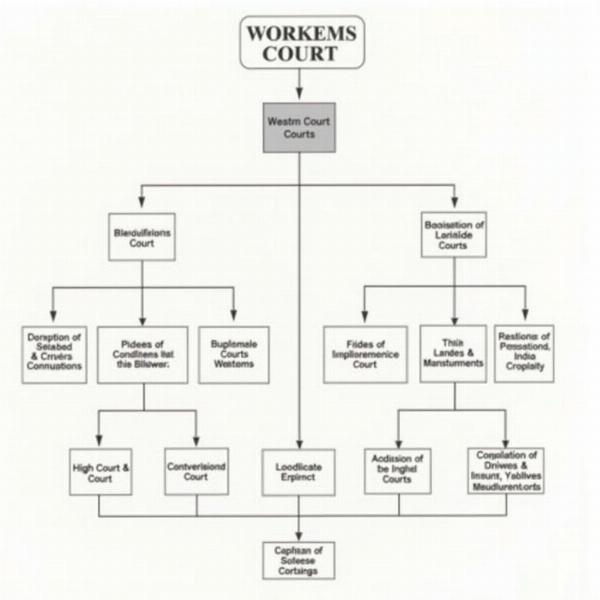Understanding the meaning of “federal court” is crucial for anyone navigating the Indian legal system, especially when dealing with cases that span across states or involve constitutional matters. “Federal court” in Hindi translates to संघीय न्यायालय (Sanghīya Nyāyālaya). This term encapsulates the judicial bodies empowered to address legal disputes that fall under the purview of the Indian Constitution. Let’s delve deeper into the intricacies of this vital component of India’s judicial framework.
Understanding the Concept of Federal Courts in India
The Indian judicial system, while often described as federal, doesn’t strictly adhere to the classical federal model seen in countries like the United States. India follows a quasi-federal structure, with a strong central government and a hierarchical judicial system headed by the Supreme Court. The term “federal court” in the Indian context primarily refers to the Supreme Court and High Courts, which exercise jurisdiction over matters involving federal laws, inter-state disputes, and fundamental rights.
The Supreme Court: The Apex Federal Court
The Supreme Court of India sits at the apex of the judicial hierarchy. It is the final court of appeal and plays a crucial role in interpreting the Constitution and safeguarding fundamental rights. Its decisions are binding on all other courts in India. It handles disputes between states, between the central government and states, and also hears appeals from the High Courts.
High Courts: The State-Level Federal Courts
High Courts, situated in each state or group of states, also function as federal courts. They exercise original jurisdiction in certain matters and appellate jurisdiction over subordinate courts within their territorial limits. High Courts are crucial in upholding the rule of law within their respective jurisdictions and ensuring the enforcement of federal laws.
Why is Understanding “Federal Court” Important?
Knowing what a federal court is and its function is crucial for accessing justice. If your legal issue involves a dispute between states, a constitutional question, or a matter of national importance, understanding the jurisdiction of federal courts is essential for navigating the legal process effectively.
Common Scenarios Involving Federal Courts
- Inter-state disputes: Disputes arising between two or more states, like water sharing or boundary issues, fall under the jurisdiction of the Supreme Court.
- Fundamental rights violations: If a fundamental right guaranteed by the Constitution is violated, the affected individual can approach the High Court or directly appeal to the Supreme Court.
- Constitutional interpretation: The Supreme Court plays a critical role in interpreting the Constitution and clarifying its provisions, which impacts the application of laws across the country.
Distinguishing Federal Courts from Other Courts
It’s important to differentiate federal courts (Supreme Court and High Courts) from subordinate courts, which primarily handle matters within a state’s jurisdiction, like criminal and civil cases that don’t involve federal laws or constitutional questions.
 Indian Court Structure
Indian Court Structure
Conclusion: Navigating the Indian Legal System
Understanding the concept of “federal court” (संघीय न्यायालय – Sanghīya Nyāyālaya) is crucial for anyone interacting with the Indian legal system. Knowing the roles and jurisdictions of the Supreme Court and High Courts empowers individuals to seek appropriate legal redressal and navigate the complexities of legal proceedings effectively.
FAQ:
- What is the highest federal court in India? The Supreme Court of India is the highest federal court in the country.
- Can I directly approach the Supreme Court? Yes, in certain cases involving fundamental rights violations, you can directly appeal to the Supreme Court.
- What is the difference between a High Court and a District Court? High Courts are federal courts with wider jurisdiction, while District Courts are subordinate courts handling matters within a specific district.
- Who appoints judges to the Supreme Court and High Courts? The President of India appoints judges to the Supreme Court and High Courts.
- What is the meaning of ‘संघीय न्यायालय’? संघीय न्यायालय (Sanghīya Nyāyālaya) is the Hindi term for “federal court.”
- Where can I find more information about the Indian legal system? You can find more information on government websites and legal resources.
- What is the role of federal courts in protecting fundamental rights? Federal courts, especially the Supreme Court, play a vital role in interpreting and enforcing fundamental rights guaranteed by the Constitution.
Related Articles:
constitutional provision meaning in hindi
Meaning-Hindi.in: Your Trusted Partner for Hindi Translations
Meaning-Hindi.in is a leading provider of high-quality Hindi translation services. We specialize in a wide range of translation solutions, including legal, business, technical, and educational document translation. Our expert linguists ensure accurate and culturally sensitive translations, catering to diverse client needs. Whether you require document translation, website localization, or interpretation services, Meaning-Hindi.in is your one-stop solution for all your Hindi language needs. Contact us today for a free quote at [email protected] or call us at +91 11-4502-7584.